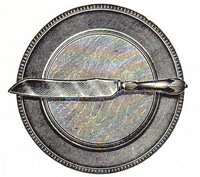 Today, October 24th …
Today, October 24th …Another story about Samuel Johnson today folks, with no apologies for referring to the man so often - he is a culinary-quotation lover’s one-man source. His eager biographer James Boswell scribbled down The Man’s fairly lengthy musings on the topic of pudding, on this day in 1773.
“ …. He then indulged in a playful fancy, in making a Meditation on a Pudding, of which I hastily wrote down, in his presence, the following note; which, though imperfect, may serve to give my readers some idea of it.
MEDITATION ON A PUDDING
Let us seriously reflect of what a pudding is composed. It is composed of flour that once waved in the golden grain, and drank the dews of the morning; of milk pressed from the swelling udder by the gentle hand of the beauteous milkmaid, whose beauty and innocence might have recommended a worse draught; who, while she stroked the udder, indulged no ambitious thoughts of wandering in palaces, formed no plans for the destruction of her fellow-creatures; milk, which is drawn from the cow, that useful animal, that eats the grass of the field, and supplies us with that which made the greatest part of the food of mankind in the age which the poets have agreed to call golden. It is made with an egg, that miracle of nature, which the theoretical Burnet has compared to creation. An egg contains water within its beautiful smooth surface; and an unformed mass, by the incubation of the parent, becomes a regular animal, furnished with bones and sinews, and covered with feathers. – Let us consider; can there be more wanting to complete the Meditation on a Pudding? If more is wanting, more may be found. It contains salt, which keeps the sea from putrefaction: salt, which is made the image of intellectual excellence, contributes to the formation of a pudding.”
The Great Man was rather less lyrical in his famous dictionary, as would be expected.
PUDDING:
1. A kind of food variously compounded, but generally made of meal, milk, and eggs.
2. The gut of an animal.
3. A bowel stuffed with certain mixtures of meal and other ingredients
PUDDINGTIME:
1. The time of dinner, the time at which pudding, anciently the first dish, is set upon the table.
2. Nick of time; critical minute.
Johnson’s definition of pudding clearly refers to the earlier meaning of a savoury dish, either a suet or batter pudding or the meaty version which is essentially sausage, rather than the sweet, dessert meaning more in use today. A suet or batter pudding (such as Yorkshire Pudding) was commonly served at the beginning of a meal, to fill the stomach before the rather more expensive meat was served – if indeed it was served at all. He nowhere hints at the use of sugar, and yet cookbooks of the time had many sweet versions, including the following one from the first Scottish cookbook, printed several decades before Sam’s pronouncements on the topic.
Recipe for the Day …
From “Mrs McLintock’s Receipts for Cookery and Pastrywork”, 1736.
To make an Orange Pudding.
Take four Oranges, and a Pound of Sugar; take the Skin off the Oranges, and beat the Pulp, boil the skins tender, and beat them very well, then take nine Eggs, keep out three of the Whites, and beat the Eggs and Sugar together, and beat your Oranges with a Quarter a Pound of Butter; then grate a half Penny Loaf, and beat the Loaf and them together; then put in your Sugar and Eggs, and half a Mutchkin of Sweet Cream, and beat them all together; then put on the Cover, and send it to the Oven.
[no salt]
Tomorrow’s Story …
Chaucer’s Cook.
Quotation for the Day …
If you could make a pudding wi' thinking o' the batter, it 'ud be easy getting dinner. George Eliot in "Adam Bede,"
No comments:
Post a Comment